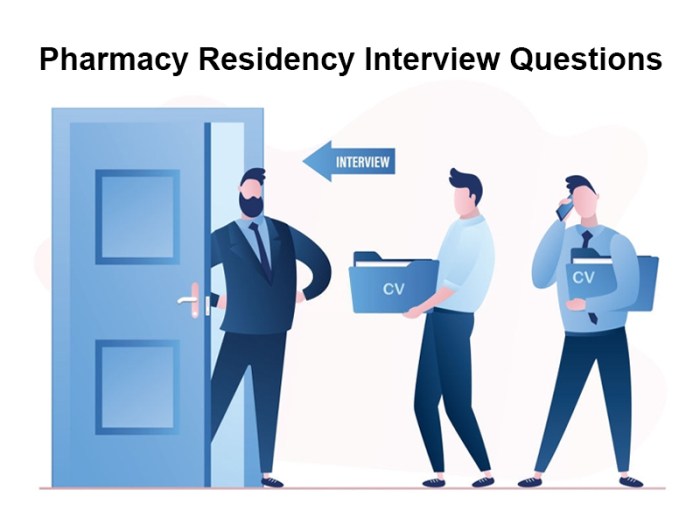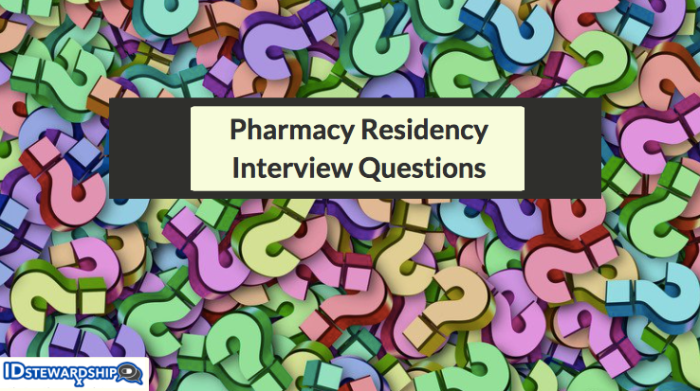As pharmacy residency interview clinical questions take center stage, this opening passage beckons readers into a world crafted with authoritative knowledge, ensuring a reading experience that is both absorbing and distinctly original.
This comprehensive guide will delve into the intricacies of pharmacy residency interviews, equipping readers with the essential knowledge and strategies to navigate the clinical questions effectively. From understanding the types of questions to developing tailored responses, this guide provides a roadmap to success for aspiring pharmacy residents.
General Interview Questions

Understanding the common interview questions and preparing for them can help you feel more confident and perform well during your pharmacy residency interview. These questions are designed to assess your knowledge, skills, and experiences.
Behavioral questions focus on your past experiences and how you have handled specific situations. To answer these questions effectively, use the STAR method (Situation, Task, Action, Result) to provide a clear and concise response.
Situational questions are hypothetical scenarios that you may encounter in the role of a pharmacy resident. When answering these questions, consider the potential impact of your actions on patient care and the healthcare team.
Clinical Pharmacy Knowledge
Pharmacy residency programs offer specialized training in various areas of pharmacy practice. During your interview, you may be asked about the different types of programs and the roles and responsibilities of a pharmacy resident.
Clinical pharmacy interventions involve identifying and resolving medication-related problems to improve patient outcomes. Examples of interventions include medication reconciliation, medication therapy management, and patient education.
Medication safety and patient counseling are crucial aspects of pharmacy practice. You should be able to discuss your understanding of these topics and demonstrate your ability to effectively communicate with patients and healthcare professionals.
Communication and Interpersonal Skills

Effective communication is essential in pharmacy to ensure accurate medication use and positive patient outcomes. You should be able to build rapport with patients and healthcare professionals and handle difficult conversations with empathy and professionalism.
Techniques for building rapport include active listening, empathy, and nonverbal cues. When handling difficult conversations, it is important to remain calm, respectful, and focused on finding a mutually acceptable solution.
Leadership and Management
Leadership and management skills are important for pharmacy residents who may be involved in supervising and motivating teams. Discuss your understanding of effective leadership and management principles.
Examples of how to motivate and lead a team include setting clear expectations, providing feedback, and recognizing achievements. Effective managers also foster a positive and collaborative work environment.
Professional Development and Research

Professional development is crucial for staying up-to-date with the latest advancements in pharmacy practice. Describe your commitment to continuous learning and your plans for pursuing professional development opportunities.
Research plays a vital role in advancing the pharmacy profession. Discuss your understanding of the research process and how you can contribute to research as a pharmacy resident.
Program-Specific Questions
To prepare for program-specific questions, research the program’s mission, goals, and faculty. Tailor your answers to demonstrate your understanding of the program and how your skills and experiences align with its objectives.
Specific questions to ask during the interview may include:
| Area | Questions |
|---|---|
| Program structure | Can you provide an overview of the program’s structure and curriculum? |
| Rotations | What are the required and elective rotations offered by the program? |
| Faculty and preceptors | Who are the key faculty members and preceptors involved in the program? |
| Research opportunities | What opportunities are available for residents to participate in research? |
| Career development | How does the program support the career development of its residents? |
Questions to Ask the Interviewers
Asking thoughtful questions at the end of the interview demonstrates your interest and engagement. Questions can focus on the program’s strengths, opportunities for professional growth, and the interviewers’ perspectives on the profession.
Examples of questions to ask:
- What are the unique strengths of this residency program compared to others?
- What are the opportunities for residents to develop their leadership and management skills?
- What are your thoughts on the future of pharmacy practice and how is the program preparing residents for these changes?
Answers to Common Questions: Pharmacy Residency Interview Clinical Questions
What are the most common clinical questions asked in pharmacy residency interviews?
Common clinical questions include those related to patient assessment, medication therapy management, drug interactions, and disease states.
How can I prepare for clinical questions in pharmacy residency interviews?
Preparation involves reviewing clinical pharmacy concepts, practicing case-based scenarios, and seeking feedback from mentors or peers.
What are some tips for answering clinical questions effectively?
Tips include providing concise and evidence-based answers, demonstrating critical thinking skills, and communicating clearly and professionally.